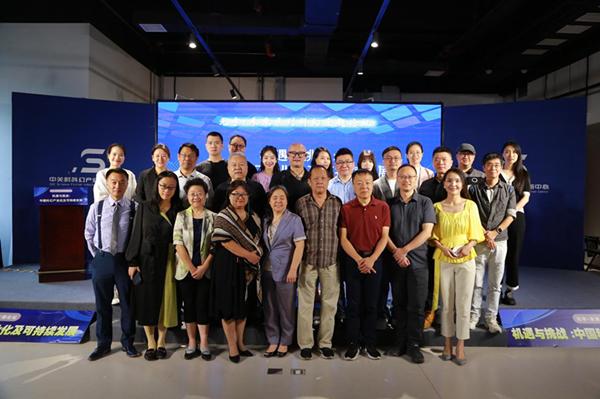Chinese sci-fi industry explores sustainable growth and industrialization at forum
- By Zhang Rui
 0 Comment(s)
0 Comment(s) Print
Print E-mail China.org.cn, October 7, 2023
E-mail China.org.cn, October 7, 2023
A forum was held in Beijing on Sept. 23, addressing the opportunities and challenges presented by Chinese science fiction's industrialization and sustainable development.

Sci-fi experts, writers, and industry leaders at a forum discussing the industrialization and sustainable development of Chinese sci-fi pose for a photograph during the event in Beijing on Sept. 23, 2023. [Photo courtesy of Beijing Yuanyu Science Fiction and Future Technology Research Institute]
At the event, Yin Chuanhong, deputy secretary of the Chinese Writer Association of Science Popularization, accentuated the recent growth in China's sci-fi industry, stressing the importance of innovation and skilled individuals. "With the acceleration of technological advancements, the future world will present more possibilities and challenges. Science fiction will play a central role in shaping and navigating them," he said.
In his keynote speech, sci-fi author Yang Peng analyzed the development of sci-fi across five domains: culture, era, technology, communication, and innovation. "We ought to proactively champion the growth of the sci-fi sector, delve deep, innovate, and step-by-step accomplish the goals of industrialization, commercialization, and serialization," he noted.
Jiang Bo, another accomplished writer, opined that for sci-fi to gain widespread popularity in society, it must align with societal progression and the country's technological advancement. Additionally, he encouraged science fiction authors to muster their passion when navigating the prospects of the genre's evolution.
Sun Shicheng, the general manager of Zhongguancun Science Fiction Industry Innovation Center, shared their ongoing experiments that blend science and art, with the goal of establishing a hub for innovative ideas. "At its core, we are creating a convenient platform dedicated to fostering connections, collaborations, services, and building an ecosystem. Yet, genuine breakthroughs, the inception of sci-fi works, and the industry's growth require partnerships with a diverse range of sci-fi professionals. There is a significant emphasis on how our industry can bolster related sectors or technologies and aid in realizing sci-fi aspirations. The sector's growth is contingent upon the creative expertise of our contributors and the enthusiasm they bring to the field," he said.
The forum included two roundtable discussions titled "From Science Fiction Creation to Independent Innovation in the Sci-fi Industry" and "Exploration of the Future and Sustainable Growth of China's Sci-fi Sphere." Renowned writers, specialists, and industry frontrunners enriched the discussions.
China's sci-fi researcher and writer, Xu Yanli, a professor at Hebei University of Science and Technology, emphasized that classic sci-fi works should have a robust cultural foundation. She suggested launching more influential studies on sci-fi classics to attract greater societal attention and refining these classics to enhance their quality.
Liu Bing, a professor at the Department of the History of Science at the School of Humanities at Tsinghua University, cautioned that while there is an urgent need to advance the industrialization of the sci-fi industry, it must be underpinned by support and a foundation tailored to local conditions. This approach ensures organic and sustainable development, preventing mere trend-following or forced implementations that could lead to waste.
Cui Li, a senior partner at the Beijing-based Jingshi Law Firm, offered insights on motivating sci-fi enthusiasts nationwide to become writers and produce more original works. She underscored the importance of promotion and marketing and discussed enhancing the protection of creators' legitimate rights and safeguarding the legal rights specific to sci-fi creators.
Xu Yangke, the former deputy editor-in-chief at China Science and Technology Press, emphasized that, compared to the West, China's sci-fi content, including original works, is relatively limited. This shortfall is also evident in popular science works. Considering China's immense market potential and communication abilities that match the West, Xu contends that the primary focus should be on improving the quality of Chinese sci-fi pieces. He also advocated for state-supported measures, such as tax benefits and curriculum changes, emphasizing the integration of sci-fi into educational settings.
"I believe China's sci-fi industry has much room for growth. It's understandable that the national and governmental levels are ardently promoting science fiction. I think the aim is to mold China into an innovative nation, and we wholeheartedly endorse this endeavor," he stated.






Go to Forum >>0 Comment(s)